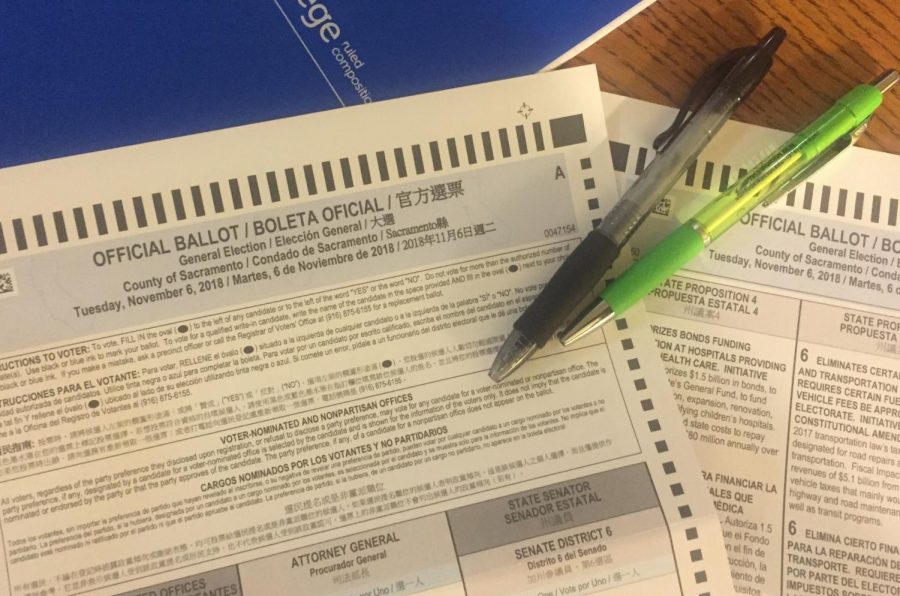State proposition and local measures voting guide
Ballot measure can be complicated, they don’t have to be
Will Coburn -The State Hornet
A sample of the Nov. 6, ballot. California voters will have a total of 11 propositions to vote on.
October 31, 2018
On Election Day, Nov. 6, Californians will decide on 11 different statewide propositions, and a pair of ballot measures for the city of Sacramento.
Danielle Aragon, civic engagement coordinator for Associated Students, Inc. at Sacramento State, said she recommends everyone take the time to research and vote on the state and local propositions.
“Even if it seems like it won’t affect you, it may affect people you know,” Aragon said. “Not everybody that you know has the eligibility to vote, so it’s important that if you do you exercise the ability to help not only you but everybody around you.”
Aragon, however, stressed the importance of an informed vote.
“If you don’t know something about a position and you haven’t found enough information or you’re just not comfortable voting for either candidate, don’t feel obligated to vote,” Aragon said.
To help start the research into your ballot, here’s all the California statewide propositions and Sacramento City ballot measures clarified without the legal jargon in your voting guide.
Proposition 1
Prop 1 is a $4 billion spending package for a collection of housing initiatives that will be paid back to bondholders $170 million annually for the next 35 years. The grants are focused on low-income and multi-family housing programs, as well as a program offering loans to veterans to buy houses and farms.
Proposition 2
Prop 2 funds the No Place Like Home Program by using the 1 percent tax of incomes making over a million dollars. No Place Like Home builds 20,000 permanent supportive housing units for the homeless. The program also provides coordinated mental health care, addiction services, case management services, medical care and education.
Proposition 3
Prop 3 authorizes $8.877 billion in bonds for water management purposes. Funds would go to state parks and conservancies for the purpose of restoring and protecting natural watersheds. Funds are also allocated for groundwater protection and maintaining and improving water systems infrastructure. The interest on the bonds is expected to cost an additional $8.4 billion, making the total cost $17.3 billion over 40 years.
Proposition 4
Prop 4 allows the state to issue $1.5 billion in bonds to fund construction, expansion and improvement of children’s hospitals. The total cost is expected to be $2.9 billion over the next 35 years.
Proposition 5
Prop 5 allows homeowners over the age of 55 or who are severely disabled to transfer the tax rate of their old home to a new home, no matter the new homes market value, location in the state or how many time the person has moved. Previously, residents were only able to transfer their lowered tax rate if they were moving from a home they had owned since 1978. This tax transfer is expected to cost local governments and schools roughly $1 billion per year.
Proposition 6
Prop 6 would repeal the gas tax and vehicle registration fees that were implemented by the Road Repair and Accountability Act of 2017. Prop 6 would also require any further taxes on fuel and vehicle fees to be done by statewide proposition. This would cost the state $2.9 billion currently, and as much as $4.9 billion after 2020.
Proposition 7
Prop 7 would allow the California legislature to move California to permanent daylight savings time, if the federal law is also changed to allow for permanent daylight savings time. As of now, the federal law only allows for states to enact permanent standard time, meaning currently, the law would not allow the state to change to permanent daylight savings.
Proposition 8
This proposition allows the state to regulate dialysis clinics, requiring them to issue refunds to patients for revenue above 115 percent of the costs of direct patient care. Costs that are spent on improving patient care will not need to be refunded.
Proposition 10
Prop 10 allows local government to enact rent control. This would let local governments place limits on how much rental prices can increase year to year.
Proposition 11
Requires ambulance drivers to remain on call during their breaks. The interrupted break would not count as one of the breaks they are required to have. The proposition also requires ambulance providers to maintain sufficient staffing levels, allowing ambulance drivers to take breaks and provide increased training.
Proposition 12
This prop creates new minimum space requirements for farm animals. The current standards are based on the animal’s movement and behavior. This measure would also ban the sale of animal products from establishments that do not reach these standards.
Measure K
This measure would create a pair of amendments to the city charter. The first establishes the City Auditor as a “charter officer,” meaning the city council can not fire them and their removal would be handled by the voters. It would also roll the responsibilities of the Independent Budget Analyst into that of the Auditor. Measure K also requires that the City Council’s meeting dates and times be established annually by resolution.
Measure U
This is a 1 cent sales tax. Currently, there is a 1/2 cent sales tax that this measure would replace. This sales tax funds city services such as 9-1-1 call centers, fire and libraries.
































































































































